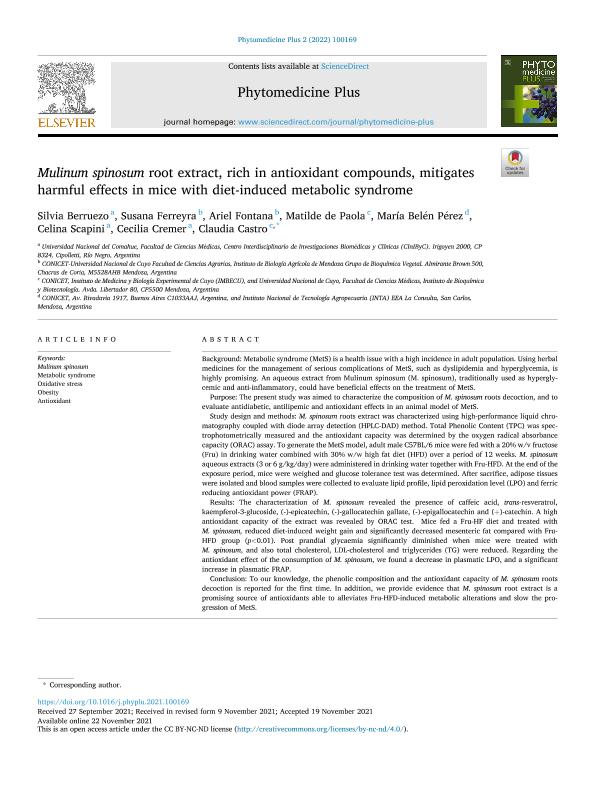Mostrar el registro sencillo del ítem
dc.contributor.author
Berruezo Puebla, Silvia Beatriz

dc.contributor.author
Ferreyra, Susana Gisela

dc.contributor.author
Fontana, Ariel Ramón

dc.contributor.author
de Paola, Maria Matilde

dc.contributor.author
Pérez, María Belén

dc.contributor.author
Scapini, Celina Margarita

dc.contributor.author
Cremer, Maria Cecilia

dc.contributor.author
Castro, Claudia Magdalena

dc.date.available
2023-07-11T15:20:07Z
dc.date.issued
2022-02
dc.identifier.citation
Berruezo Puebla, Silvia Beatriz; Ferreyra, Susana Gisela; Fontana, Ariel Ramón; de Paola, Maria Matilde; Pérez, María Belén; et al.; Mulinum spinosum root extract, rich in antioxidant compounds, mitigates harmful effects in mice with diet-induced metabolic syndrome; Elsevier; Phytomedicine Plus; 2; 1; 2-2022; 1-8
dc.identifier.issn
2667-0313
dc.identifier.uri
http://hdl.handle.net/11336/203271
dc.description.abstract
Background: Metabolic syndrome (MetS) is a health issue with a high incidence in adult population. Using herbal medicines for the management of serious complications of MetS, such as dyslipidemia and hyperglycemia, is highly promising. An aqueous extract from Mulinum spinosum (M. spinosum), traditionally used as hyperglycemic and anti-inflammatory, could have beneficial effects on the treatment of MetS. Purpose: The present study was aimed to characterize the composition of M. spinosum roots decoction, and to evaluate antidiabetic, antilipemic and antioxidant effects in an animal model of MetS. Study design and methods: M. spinosum roots extract was characterized using high-performance liquid chromatography coupled with diode array detection (HPLC-DAD) method. Total Phenolic Content (TPC) was spectrophotometrically measured and the antioxidant capacity was determined by the oxygen radical absorbance capacity (ORAC) assay. To generate the MetS model, adult male C57BL/6 mice were fed with a 20% w/v fructose (Fru) in drinking water combined with 30% w/w high fat diet (HFD) over a period of 12 weeks. M. spinosum aqueous extracts (3 or 6 g/kg/day) were administered in drinking water together with Fru-HFD. At the end of the exposure period, mice were weighed and glucose tolerance test was determined. After sacrifice, adipose tissues were isolated and blood samples were collected to evaluate lipid profile, lipid peroxidation level (LPO) and ferric reducing antioxidant power (FRAP). Results: The characterization of M. spinosum revealed the presence of caffeic acid, trans-resveratrol, kaempferol-3-glucoside, (-)-epicatechin, (-)-gallocatechin gallate, (-)-epigallocatechin and (+)-catechin. A high antioxidant capacity of the extract was revealed by ORAC test. Mice fed a Fru-HF diet and treated with M. spinosum, reduced diet-induced weight gain and significantly decreased mesenteric fat compared with Fru-HFD group (p<0.01). Post prandial glycaemia significantly diminished when mice were treated with M. spinosum, and also total cholesterol, LDL-cholesterol and triglycerides (TG) were reduced. Regarding the antioxidant effect of the consumption of M. spinosum, we found a decrease in plasmatic LPO, and a significant increase in plasmatic FRAP. Conclusion: To our knowledge, the phenolic composition and the antioxidant capacity of M. spinosum roots decoction is reported for the first time. In addition, we provide evidence that M. spinosum root extract is a promising source of antioxidants able to alleviates Fru-HFD-induced metabolic alterations and slow the progression of MetS.
dc.format
application/pdf
dc.language.iso
eng
dc.publisher
Elsevier

dc.rights
info:eu-repo/semantics/openAccess
dc.rights.uri
https://creativecommons.org/licenses/by-nc-nd/2.5/ar/
dc.subject
ANTIOXIDANT
dc.subject
METABOLIC SYNDROME
dc.subject
MULINUM SPINOSUM
dc.subject
OBESITY
dc.subject
OXIDATIVE STRESS
dc.subject.classification
Endocrinología y Metabolismo

dc.subject.classification
Medicina Clínica

dc.subject.classification
CIENCIAS MÉDICAS Y DE LA SALUD

dc.subject.classification
Otras Ciencias de la Salud

dc.subject.classification
Ciencias de la Salud

dc.subject.classification
CIENCIAS MÉDICAS Y DE LA SALUD

dc.title
Mulinum spinosum root extract, rich in antioxidant compounds, mitigates harmful effects in mice with diet-induced metabolic syndrome
dc.type
info:eu-repo/semantics/article
dc.type
info:ar-repo/semantics/artículo
dc.type
info:eu-repo/semantics/publishedVersion
dc.date.updated
2023-06-30T13:07:15Z
dc.journal.volume
2
dc.journal.number
1
dc.journal.pagination
1-8
dc.journal.pais
Países Bajos

dc.journal.ciudad
Amsterdam
dc.description.fil
Fil: Berruezo Puebla, Silvia Beatriz. Universidad Nacional del Comahue. Facultad de Medicina; Argentina
dc.description.fil
Fil: Ferreyra, Susana Gisela. Consejo Nacional de Investigaciones Científicas y Técnicas. Centro Científico Tecnológico Conicet - Mendoza. Instituto de Biología Agrícola de Mendoza. Universidad Nacional de Cuyo. Facultad de Ciencias Agrarias. Instituto de Biología Agrícola de Mendoza; Argentina
dc.description.fil
Fil: Fontana, Ariel Ramón. Consejo Nacional de Investigaciones Científicas y Técnicas. Centro Científico Tecnológico Conicet - Mendoza. Instituto de Biología Agrícola de Mendoza. Universidad Nacional de Cuyo. Facultad de Ciencias Agrarias. Instituto de Biología Agrícola de Mendoza; Argentina
dc.description.fil
Fil: de Paola, Maria Matilde. Consejo Nacional de Investigaciones Científicas y Técnicas. Centro Científico Tecnológico Conicet - Mendoza. Instituto de Medicina y Biología Experimental de Cuyo; Argentina
dc.description.fil
Fil: Pérez, María Belén. Consejo Nacional de Investigaciones Científicas y Técnicas; Argentina. Instituto Nacional de Tecnología Agropecuaria. Centro Regional Mendoza-San Juan. Estación Experimental Agropecuaria La Consulta; Argentina
dc.description.fil
Fil: Scapini, Celina Margarita. Universidad Nacional del Comahue. Facultad de Medicina; Argentina
dc.description.fil
Fil: Cremer, Maria Cecilia. Universidad Nacional del Comahue. Facultad de Medicina; Argentina
dc.description.fil
Fil: Castro, Claudia Magdalena. Consejo Nacional de Investigaciones Científicas y Técnicas. Centro Científico Tecnológico Conicet - Mendoza. Instituto de Medicina y Biología Experimental de Cuyo; Argentina
dc.journal.title
Phytomedicine Plus
dc.relation.alternativeid
info:eu-repo/semantics/altIdentifier/url/https://www.sciencedirect.com/science/article/pii/S2667031321001512
dc.relation.alternativeid
info:eu-repo/semantics/altIdentifier/doi/https://doi.org/10.1016/j.phyplu.2021.100169
Archivos asociados
